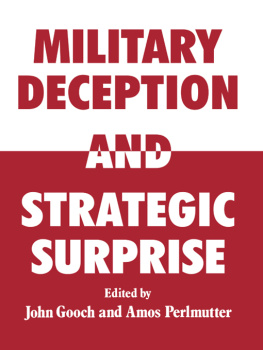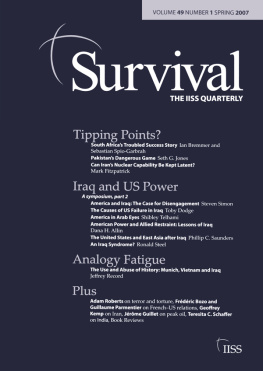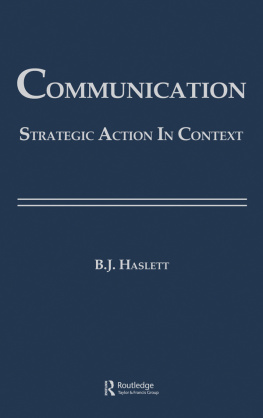MILITARY DECEPTION AND
STRATEGIC SURPRISE
MILITARY DECEPTION
AND
STRATEGIC SURPRISE
Edited by
John Gooch
and
Amos Perlmutter
First published 1982 in Great Britain by
FRANK CASS AND COMPANY LIMITED
2 Park Square, Milton Park, Abingdon,
Oxon, OX14 4RN
and in the United States of America by
FRANK CASS AND COMPANY LIMITED
270 Madison Ave,
New York NY 100 16
Transferred to Digital Printing 2005
Copyright 1982 Frank Cass & Co. Ltd.,
British Library Cataloguing in Publication Data
Military deception and strategic surprise.
1. Tactics 2. Military art and service
I. Gooch, John II. Perlmutter, Amos
355.42 U167
ISBN 0-7146-3202-3
This group of studies first appeared in a Special Issue on 'Military Deception and Strategic Surprise' of The Journal of Strategic Studies Vol. No. 1 . published by Frank Cass & Co. Ltd
All rights reserved. No part of this publication may be reproduced, stored in a retrieval system, or transmitted in any form, or by any means, electronic, mechanical, photocopying, recording, or otherwise, without the prior permission of Frank Cass and Company Limited.
Contents
| Barton Whaley |
| Michael Mihalka |
| Janice Gross Stein |
| Michael I. Handel |
| Donald C. Daniel and Katherine L. Herbig |
| Barton Whaley |
Notes on Contributors
Barton Whaley is Research Director of the International Center, Inc., Washington D.C., and former Associate Professor of World Politics at Fletcher School of Law and Diplomacy.
Michael Mihalka has been an employee at The Rand Corporation since 1977. He has written extensively on a wide range of national security issues including strategic studies, arms transfers, non-proliferation and conflict management.
Janice Gross Stein , Associate Professor of Political Science, McGill University, is co-author of Rational Decision Making: Israels Security Choices, 1967 (Ohio State University Press, 1980), and has published articles in International Journal. Canadian Journal of Political Science, Journal of Conflict Resolution.
Michael Handel received his Ph.D. from Harvard University in 1974. He is a research associate at the Harvard Center for International Affairs. Among his publications are The Israeli Political-Military Doctrine (1973); Perception, Deception and Surprise: The Case of the Yom Kippur War (1976); The Study of War Termination (1979); Weak States in the International System (1981); and The Diplomacy of Surprise: Hitler, Stalin, Sadat (1981).
Donald C. Daniel is Associate Professor of National Security Affairs at the Naval Postgraduate School and in 1981 was a guest scholar at the Brookings Institution in Washington, D.C. He is the editor of International Perceptions of the Superpower Military Balance (1978), a regular contributor to the Soviet Armed Forces Review Annual, and author of numerous articles, dealing mainly with naval affairs. He is a recent winner of a Ford Foundation grant and is completing a study on anti-submarine warfare and strategic stability. Together with Katherine Herbig, he recently co-edited Strategic Military Deception (1982).
Katherine L. Herbig is an Assistant Professor at the Naval Postgraduate School, where she teaches American and Modern European History in the Department of National Security Affairs, and undertakes historical research on military topics. In addition to work on deception, her current research interests include strategic theory and the problem of surprise attack. Together with Donald C. Daniel, she recently co-edited Strategic Military Deception.
Introduction
Deception is a conscious and rational effort deliberately to mislead an opponent. It seeks to create in the adversary a state of mind which will be conducive to exploitation by the deceiver. As such, deception is one of the oldest and most effective weapons of warfare. As a form of trickery it has acquired a pejorative connotation: just as Gentlemen do not open each others mail, so decent people should not engage in what is sometimes seen as an indecent activity. But strategic deception, far from being either ungentlemanly or random, is a systematic and consistent process in which success may bring substantial benefits.
As each of the authors in this collection demonstrates, deception is conceptually related to perception and misperception. In order to succeed, the deceiver must penetrate the inner mind of his opponent to identify the assumptions, expectations and aspirations of the adversary. He must then convey the notion of a partnership by convincing his opponent that his posture is genuine or sincere. The whole process of deception is an effort at self-projection designed to enhance the opponents aspirations and thus make the deceived vulnerable to the deceiver.
Deception is frequently a weapon of the weak. The strong are generally more relaxed, unsystematic and arrogant in their approach to war against the weak, thus giving the latter a badly-needed advantage in the war of deception. Three case studies included here amply demonstrate this thesis: the Weimar Republics circumspection in overcoming the restrictions of the Versailles Treaty; the Soviet missile inferiority (19621973); and the Egyptian airmissile/military inferiority to Israel between 1967 and 1973.
Barton Whaley, in the first contribution, deals with what can best be termed straightforward deception in his analysis of Germanys evasion of the restrictions imposed upon her by the Paris peace treaty of 1919. Catering to a popular perception of a defeated, war-weary and pacific Germany, the political and military establishment engaged in cheating, lying, camouflaging, covert arms operations and concealments of infinite variety. The result was an operation whose success was due mainly to a well-conceived, efficiently organized and expertly co-ordinated programme of deception.
Michael Mihalka, in his paper on Russian deception, cements Whaleys thesis that for a deception to be successful it must be both wilful and systematic. In order to achieve strategic superiority and the modernization of Soviet nuclear missiles, the strategy of deception became one of persuading the United States that the Soviets did not want superiority but were, at worst, seeking parity, and at best wanted to stop the arms race. In reality the USSR wanted to modernize rapidly and forcefully without stimulating an equally dramatic United States response. The Soviet attempts to persuade the United States that arms reduction is a common aspiration of the two superpowers, and that the USSR seeks a military balance, have in the past depended in part at least upon a systematic deception.
Janice Gross Stein demonstrates in her paper that deception is an important element of surprise. Military and political deception is a force multiplier, and for Egypt between 1967 and 1973 it became a significant military asset. In order to overcome their obvious military inferiority, the Egyptians chose not to attempt to achieve military superiority but rather to deceive the Israelis. In this they were immensely aided by Israeli self-deception and over-confidence after the spectacular gains of the 1967 war. The Egyptians attempted to achieve limited military objectives such as crossing the Canal of Shame which in turn brought them far greater political advantages than the limited tactical successes they achieved. The ambiguous line between the defensive and offensive, and the continuous Egyptian exercises between 1971 and 1973 finally succeeded in surprising the Israelis during the October War.








